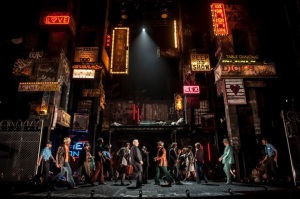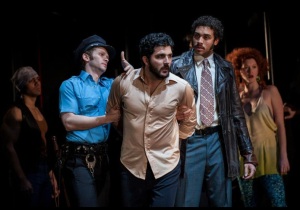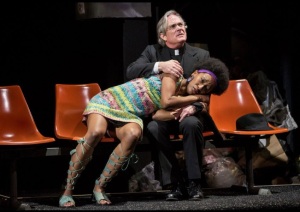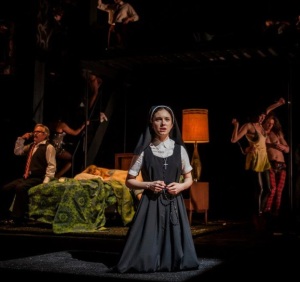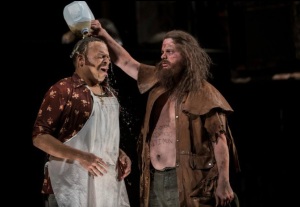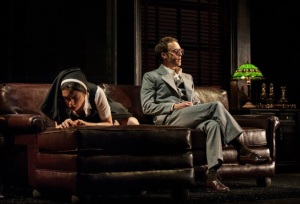Measure for Measure
WHAT: Measure for Measure
WHEN: March 9 – April 14, 2013 (schedule)
WHERE: Goodman Theatre (170 N. Dearborn St.)
RUNTIME: 2 Hours and 40 minutes, with a 15 minute intermission
WHO: Goodman Theatre
PRICE: $25-86
OUR RATING: Chance It!
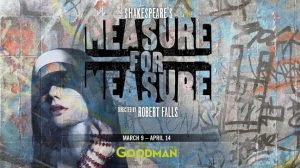 It seems that Chicago has an appetite for Shakespeare recently, and especially for some of the less-performed works from the Bard’s repertoire. One of the three “problem plays,” Measure for Measure
It seems that Chicago has an appetite for Shakespeare recently, and especially for some of the less-performed works from the Bard’s repertoire. One of the three “problem plays,” Measure for Measure has been classified as a dark comedy, though audiences consistently find its treatment of certain subjects distasteful. In the Goodman Theatre’s production, Measure for Measure is transposed to 1970s New York, where greed, lust and depravity rule supreme.
The Duke of Vienna determines to leave the city in the hands of Lord Angelo, during whose brief reign laws that had fallen into obscurity are prosecuted most vigorously. This leads the young man Claudio, who has been involved in an unconsecrated relationship with Juliet, to be arrested and sentenced to die. His fate lies with his sister, the nun Isabella, who must appeal to Angelo for her brother’s life, and bear his dreadful, lecherous proposal.
Adam: I have a statement to make: updating Shakespeare rarely ever works, and especially if significant scripting changes do not occur. By specifically setting the play in 1970s New York City, director Robert Falls has limited himself, making references throughout the play incompatible with his vision, and generally undermining the story.
Perhaps it’s the fact that I come from an education rooted in historical study, or that I’ve seen my fair share of traditionally-staged Shakespeare in England that works fantastically, but I just can’t fully get behind these types of changes. They alter the essence of the work, allowing audiences to conveniently skip over the history involved in favor of more recent events they can understand without learning the background.
That being said, one must give Goodman credit for attempting a play that does not translate well to the modern day, with ample misogyny that must be dealt with in order for the play to be successful.
Some star performances were to be had from the amusing and versatile James Newcomb (Duke Vincentio), whose eloquence and charm make his depiction of depraved royalty most watchable, while supporting actor Sean Fortunato (Elbow) provides a humorous and uncannily accurate depiction of a New York City police officer.
Unfortunately, the final reveal of the play seemed to be elongated, so that one thought the Duke almost cruel in his actions. Nevertheless, Measure for Measure will appeal to some audiences, with its likability based mainly on your personal preference for how Shakespeare should be performed.
Alicia: Overall, I was pretty disappointed with this production, and to be honest, I haven’t enjoyed much I’ve seen at the Goodman since The Seagull a few years ago. Yet, if you can score some cheap student/Hot Tix tickets, this production is on an entire different scale than anything else you’ll see in Chicago, with the possible exception of Broadway in Chicago and the like. It’s big. It’s loud. It’s certainly trying to say something, and trying really, really hard.
The prologue is perhaps the most impressive moment of the play, where director Robert Falls drops us most foully (and in slow motion no less) into a sleazy and sex-crazed Midtown Manhattan, all to the warped tune of Donna Summer’s “Love to Love You, Baby.” With this song as a starting point, Richard Woodbury’s sound design only gets better, with beautiful original scores playing throughout most scenes and peaking with intensity during transitions.
Yet, the worst moment of the play is the final component of a Donna Summers bookend to the performance, with “Last Dance” playing for the finale while the entire cast does a choreographed disco dance, and as Falls decides to kill off a major character that survived Shakespeare’s version. Utterly tragic.
And don’t even get me started on Walt Spangler’s scenic design. While I usually love and admire Spangler’s work, it looked like the Goodman’s production of Camino Real came back to haunt me and vomited all over the stage. The Goodman sure does like to flaunt that they have lots of money, and I’ve never appreciated that aspect of their productions.
Finally, Falls tried super hard to make this piece funny, and most of the audience laughed from beginning to end. With the exception of a handful of moments, I didn’t really laugh at all. And when the audience laughed after Isabella’s (Alejandra Escalante) attempted rape, I wanted to burn the theatre down.
Final Thoughts: We’re a little on the fence with this one, as you can probably tell. “Chance It” was dangerously close to “Skip It,” but ultimately, with a generally talented cast of actors and a strong directorial point-of-view, we suggest you think about it.
